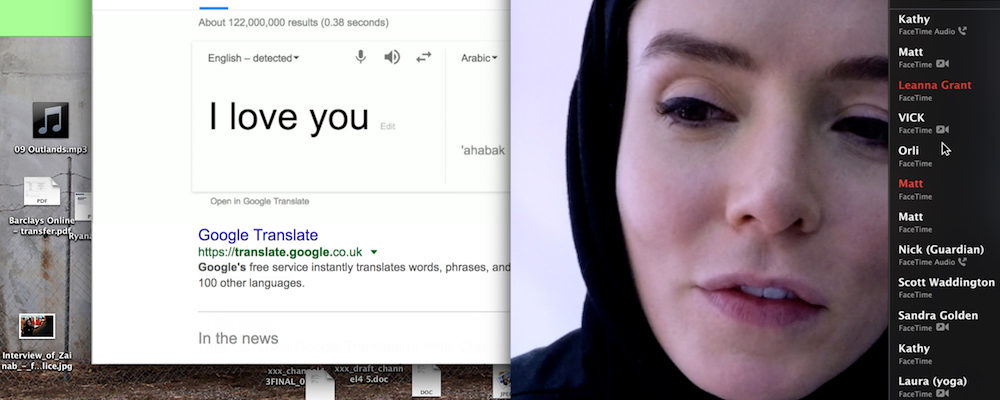Techno-Thriller ‘Profile’ Sets up a Cagey Catfish Trap for Naive Jihadists
Tony Sokol
In Kazakh filmmaker Timur Bekmambetov’s “Profile,” reckless British journalist Amy Whittaker (Valene Kane) catfishes a senior member of ISIS, Abu Bilel Al-Britani (Shazad Latif), to his destruction. She does this while her cold, ambitious TV news editor Vick (Christine Adams) dangles the horrors of unemployment over her head. Shot entirely as a first-person internet experience, the ripped-off-from-the-headlines techno-thriller film shares a thematic premise with “Unfriended” and its sequel “Unfriended: Dark Web,” produced by Bekmambetov. Those films started with an online campaign against bullying and ended by unleashing a demon on Skype.
All the action plays out on Whittaker’s laptop, as she clicks between FaceTime, YouTube, Facebook, and instant message chats. She even supervises the soundtrack through her iTunes. Like most of the emerging sub-genre of desktop horror movies like “The Den” (2013) and Nacho Vigalondo’s “Open Windows” (2014), the technical spectrum of the desktop setting feels real. This writer missed two Skype calls thinking Whittaker was ghosting her annoying fiancé Matt (Morgan Watkins). But Bekmambetov, who learned history while directing the 2016 “Ben-Hur” remake and “Abraham Lincoln: Vampire Hunter,” is less authentic with his journalism.
With a screenplay by Bekmambetov, Brittany Poulton and Olga Kharina, “Profile” is a very loose, and unrealistic, retelling of the novel “In the Skin of a Jihadist.” It was written by Anna Érelle, the non-de-plum of a French reporter whose real identity and whereabouts are unknown because of numerous fatwas and other threats against her life. The reporter set up fake Facebook and Twitter profiles which lured an international terrorist, who tried to recruit her.
In “Profile,” Whittaker is on the run from past due rent checks, while looking for an affordable place in London to share with Matt, who makes 70 percent more than she does, and therefore thinks that’s a good idea to do more cooking at home. Whittaker pitches a story on jihadi war brides and offers herself up as bait to uncover recruitment and enslavement tactics. Before her unscrupulously exploitative editor can even say “I need something that’s gonna get people talking now,” Amy creates an online identity as a recently converted Muslim, scans YouTube for tips on how to wrap her hijab, and shares some torture porn. Within seconds, the inbox on her fake Facebook profile, 19-year-old “Melody Nelson,” is filled, and not with dick picks, which would have been more realistic.
Within moments of meeting Abu Bilel, Melody is calling him a hero and, with downturned eyes, coquettishly admits she thinks he is hot. Abu is charismatic. He’s also very needy, and very open about it. He needs brave women who will cower before him. Amy pegs him as a narcissistic teenager, while Melody is charmed by his Instagram account, which profiles all the cats owned by ISIS soldiers. Before you know it, she is turning down palaces for multi-round, fully-loaded, automatic weapons, because once you have one of those, you can get anything else you need. It doesn’t take long for him to want Melody to come to Syria so he can marry her. Amy encourages this, sending flirtatious emojis about sex slaves who get beheaded trying to escape.
Whittaker manages to go deep undercover without leaving her small South London apartment. She is helped by Muslim IT assistant Lou (Amir Rahimzadeh), who she first suspects will be the “killer inside the house.” Amy doesn’t always throw caution to the wind, but she is annoyingly determined to sideline her best tool. Whittaker cuts Lou out of the loop as she gets more intimate with Bilel. Amy is almost a caricature of the reckless journalist. We never get the idea Amy is pretending to fall for the terrorist, she just falls. By the time she starts giving out details about her mother’s overdose, and actually has to erase a message outing herself as a journalist, the audience knows she is in too deep.
Abu is a zealot. Amy is an idiot. He is candid. She is stupid. There are moments where the audience feels the excruciating suspense of her impending doom. We occasionally hope for it. But just like Freddy Krueger in the “A Nightmare on Elm Street” movies, she bungles herself back into Abu’s trust and life. Behind the familiar sounds of BBC News broadcasts, Whittaker’s editor is a mythological hydra. When Amy breaks down believing she caused the death of her beloved guerilla rebel boyfriend, Vick just wants to make sure she recorded the Skype call. This isn’t to say Amy is a likable character. She’s casually racist, emotionally parasitic, socially toxic, and professionally hazardous. Her incompetence is her superpower. It all works out, for her, in the end. Even without an evil plan going in, her virtual FB-messenger demon devours the soul of the virtuous mass-murderer.
While “Profile” offers nothing on modern-day terrorism or the journalistic ethics, it captures how digital life can become more emotionally real than actual life. However, in spite of showing how seductive virtual interactions can be, we never get a sense of why a Western woman would run off to be a second class citizen, whose best future ends as a suicide bomber. “It’s the fear that is killing us,” Amy types to her ever-impatient boss. “THE FEAR!”
“Profile” is a horror film, with only a casual “like” clicked on political drama. It works best as an introduction to Anna Erelle’s horrifying story. But the overriding terror is that the film is best experienced on a computer monitor. If this were made in a more traditional way, the Skype and Facebook chats would be annoying and fake. This may be a short-lived gimmick, but there is a fear stories told purely through handheld media will be the new normal. “Profile” was made before the pandemic. In the post-Covid era, any Zoom call may be our last.
“Profile” releases May 14 in select theaters.

